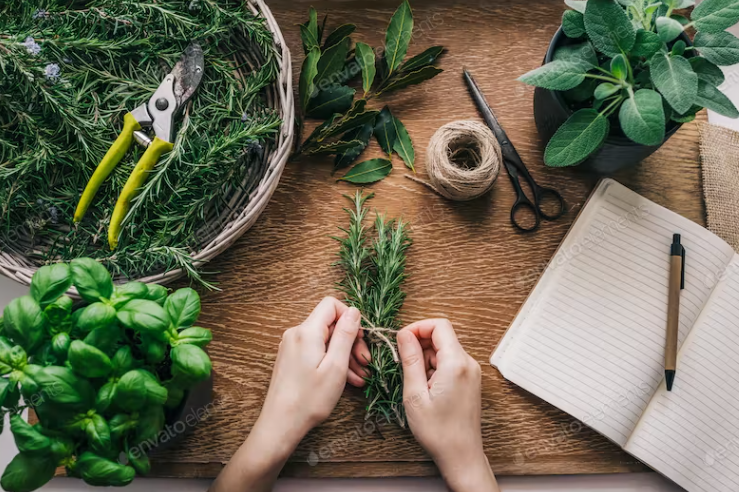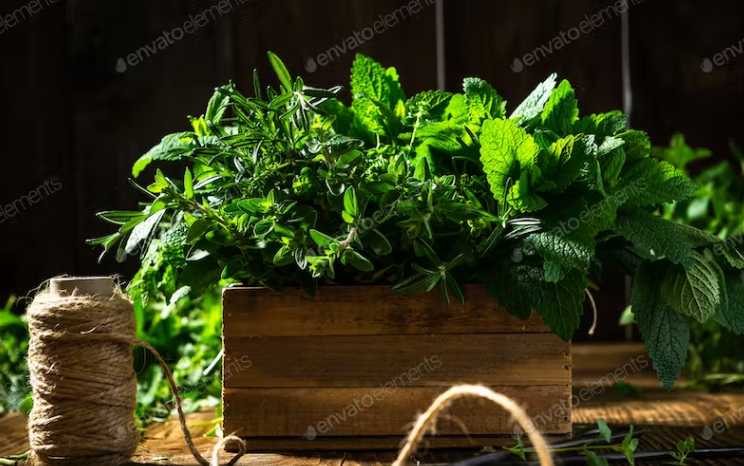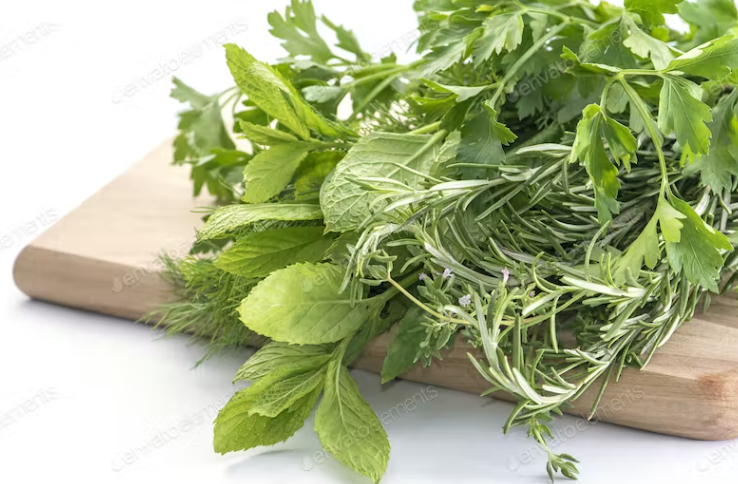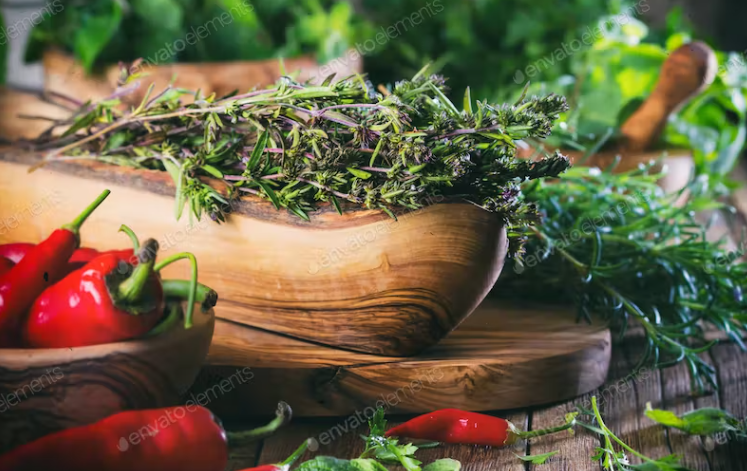
High blood pressure is one of the leading factors for heart disease and stroke – the leading causes of death in the world. There are many things you can do to lower your blood pressure, including eating a healthy diet, maintaining a healthy weight, and getting regular exercise.
Herbs have been used to treat various medical conditions for centuries. High blood pressure is a common condition that can be treated with herbs, but there are many different herbs that can be used to lower blood pressure.
In this article, we will tackle the best herbs for High Blood Pressure.
The Benefits of Herbs in Our Diet

Herbs are not only fragrant and flavorful, but they offer many health benefits as well. Herbs have been used for centuries in natural medicine for their healing properties.
There are many reasons to incorporate herbs into your diet for better health. Herbs can help boost your immune system, fight inflammation, and even improve your digestion. Adding just a few herbs to your meals can make a big difference in your overall health.
Improves Blood Pressure
Herbs can be an effective way to improve blood pressure because they help to dilate blood vessels and reduce inflammation. In addition, herbs can also promote relaxation and reduce stress levels. By reducing stress levels, herbs can help to lower blood pressure.
The use of herbs to improve blood pressure is a safe and natural option that has few side effects.
Boosts Immune System
A well-functioning immune system is a key to maintaining good health and preventing illness. There are several things you can do to keep your immune system functioning correctly, including eating a healthy diet, getting enough exercise, and managing stress. Adding herbs to your diet is another excellent way to boost your immune system.
There are many different herbs that can be beneficial for the immune system. Some of the best include echinacea, garlic, ginger, and ginseng. These herbs have all been shown to help improve immunity in various ways.
Echinacea is perhaps the most well-known herb for boosting the immune system. This herb has been used for centuries to treat various illnesses, ranging from colds and flu to more severe infections like bronchitis.
Lower Cholesterol
Herbal remedies were used to treat various ailments for centuries. In recent years, more and more people are turning to herbs to lower their cholesterol. There are many benefits of using herbs to lower cholesterol.
Herbs are natural and safe. They have fewer side effects than prescription medications. Herbs can take many forms, including capsules, tinctures, and teas. They can also be added to food or taken as supplements.
Herbs can help lower cholesterol by reducing the amount of LDL (bad) cholesterol in the blood and by increasing the level of HDL (good) cholesterol. Herbs can also help improve circulation and reduce inflammation.
Other Ways to Improve Blood Pressure

1. Walk and exercise regularly
Walking and exercising regularly can have a profound impact on blood pressure. Just a few minutes of walking daily can lower blood pressure by up to 10 points. Walking is also a great way to get the heart pumping and improve overall cardiovascular health.
Exercise is just as effective as medication for lowering blood pressure. Regular exercise can help to lower systolic blood pressure by up to 14 points. Exercise also helps to reduce the risk of developing hypertension in the first place.
Just 30 minutes of walking or other moderate exercise each day can have a significant impact on blood pressure levels. So get out there and start moving!
2. Reduce your sodium intake
If you are one of the people who struggle with high blood pressure, you may be looking for ways to lower your numbers. One simple and effective method is to reduce your sodium intake.
When you consume less sodium, your body holds on to less water. This reduces the amount of fluid in your blood, lowering blood pressure. The benefits of reducing sodium intake are not just limited to blood pressure reduction.
Studies have shown that a diet lower in sodium can also help reduce the risk of heart disease, stroke, and other cardiovascular problems. So if you want to improve your health in multiple ways, reducing your sodium intake is a great place to start.
3. Drink less alcohol
According to the Centers for Disease Control and Prevention (CDC), drinking too much alcohol can raise blood pressure. If you currently drink alcohol, the CDC recommends that men limit themselves to two drinks per day, and women should limit themselves to one drink per day.
There are many benefits to drinking less alcohol. For example, you may experience improved blood pressure, better sleep, more energy, and weight loss. Additionally, drinking less alcohol can help reduce your risk of developing cancer and other chronic diseases.
If you’re struggling to cut down on your alcohol intake, there are a few things you can do to make it easier. First, try alternating between alcoholic and non-alcoholic drinks. This will help you slow down your overall consumption. Additionally, ensure plenty of healthy snacks on hand to help curb your cravings.
4. Eat more potassium-rich foods
A diet rich in potassium can help lower blood pressure by helping to offset the effects of sodium. By eating more potassium-rich foods, you can help reduce your risk of high blood pressure and improve your overall health.
Potassium is one of the nutrients that help regulate blood pressure. When combined with a healthy diet and lifestyle, eating potassium-rich foods can have a significant impact on blood pressure.
There are many benefits to eating potassium-rich foods, including reducing the risk of stroke, heart disease, and kidney disease. Potassium also helps to prevent bone loss and maintains muscle mass.
5. Cut back on caffeine
A new study has found that cutting back on caffeine can help improve blood pressure. The study, which was conducted by the American Heart Association, looked at a group of people who consumed an average of two cups of coffee per day. The participants were asked to cut their caffeine intake by one cup per day for four weeks.
At the end of the four weeks, the participants’ blood pressure had significantly decreased.
The benefits of cutting back on caffeine don’t just stop at improved blood pressure. Caffeine is also a diuretic, which can cause you to lose water and electrolytes.
This can lead to dehydration, which can cause several different health problems. Cutting back on caffeine will help you stay hydrated and avoid these problems.
If you’re looking to improve your health, cutting back on caffeine is a great place to start.
The 15 Best Herbs for High Blood Pressure

1. Basil
Basil has been used as a herbal remedy for centuries, and recent studies have shown that it may be effective in treating high blood pressure. Basil is rich in antioxidants and anti-inflammatory compounds, which are thought to help lower blood pressure by reducing inflammation and oxidative stress.
Additionally, basil is a good source of magnesium, which is known to help regulate blood pressure.
While more research is needed to confirm the efficacy of basil in treating high blood pressure, there are many potential benefits of using this herb.
Basil is easy to find and relatively inexpensive, making it an accessible option for people looking for natural ways to lower their blood pressure. Additionally, basil has a pleasant taste and can be easily added to many dishes, making it a versatile way to get the nutrients your body needs.
2. Ginger
Experts found ginger may be the best herb for high blood pressure. They believed ginger was more effective than other herbs in reducing blood pressure. The other herbs tested included garlic, cumin, and fenugreek.
Ginger has several benefits that make it ideal for treating high blood pressure. First, it is a natural anti-inflammatory agent. This means that it can help to reduce inflammation throughout the body, including in the arteries. Second, ginger is a vasodilator. This means that it helps to widen the blood vessels, which can help to reduce blood pressure.
3. Parsley
Parsley is an excellent herb for people with high blood pressure. Its many benefits and advantages make it one of the best herbs to help keep blood pressure under control.
Parsley is rich in nutrients and antioxidants, which help to protect the body from damage caused by free radicals. Free radicals are unstable molecules that can damage cells, tissues, and organs. They are believed to be a significant cause of high blood pressure.
Parsley also helps to relax the smooth muscles in the walls of blood vessels. This action helps to reduce blood pressure by allowing the vessels to expand and blood to flow more easily through them.
In addition, parsley has diuretic properties that help to rid the body of excess fluid. This can also help to reduce blood pressure by reducing the amount of fluid in the bloodstream.
4. Prickly custard apple
There are many herbs that can help to lower blood pressure, but one of the best is the prickly custard apple. This herb has many benefits and advantages that make it ideal for those with high blood pressure.
One of the main benefits of the prickly custard apple is that it is rich in potassium. Potassium is a crucial mineral for maintaining healthy blood pressure levels. It helps to regulate fluid levels in the body and prevents sodium from building up in the blood.
Another benefit of this herb is that it is a natural diuretic. This means it helps reduce bloating and water retention, which can also contribute to high blood pressure. Additionally, the prickly custard apple can help to reduce stress and anxiety, two other significant factors that can lead to high blood pressure.
5. Chinese cat’s claw
This traditional Chinese medicine has been used for centuries to treat various ailments, and recent studies have shown that it can be effective in treating high blood pressure.
Chinese cat’s claw is a climbing vine that is native to the tropical forests of South America. The active ingredient in the Chinese cat’s claws is thought to be quinine, which is also found in the bark of the cinchona tree.
Quinine is effective in lowering blood pressure, and it is thought that the Chinese cat’s claw works similarly.
6. Thyme
Thyme is a herb with many benefits, one of which is reducing high blood pressure. There are many advantages to using thyme for this purpose.
- Thyme is a natural remedy, so it is gentle on the body and has few side effects.
- Thyme is easy to find and use. Thyme can be found in most grocery stores and is simple to add to food.
- Thyme is effective. Studies have shown that it can lower blood pressure significantly.
If you are looking for a natural way to reduce your high blood pressure, thyme may be the perfect solution. Give it a try and see for yourself!
7. Buchu
Herbs have been used medicinally for centuries and Buchu is no exception. This herb, also known as Agathosma betulina, is native to South Africa and has a long history of use in traditional medicine.
The leaves and oil of the Buchu plant make teas, extracts, and tinctures that offer a range of benefits, including relief from high blood pressure.
Buchu has diuretic properties that help to expel excess fluid from the body and reduce blood volume. This can help to lower blood pressure by decreasing the amount of work the heart has to do to pump blood around the body.
Buchu is also rich in antioxidants which can help to protect against damage caused by high blood pressure. If you are looking for a herbal remedy for high blood pressure, Buchu could be a good option.
8. Cardamom
Cardamom has many benefits that can help to reduce high blood pressure. Here are some of the advantages of using cardamom to lower blood pressure:
Cardamom is a rich source of antioxidants. These nutrients scavenge harmful free radicals from the body, which can damage cells and lead to high blood pressure.
Cardamom also contains anti-inflammatory compounds. Inflammation is a major contributing factor to high blood pressure. By reducing inflammation, cardamom can help to lower blood pressure.
In addition, cardamom supports healthy digestion. This spice helps to increase stomach acid production, which aids in the breakdown of food and prevents indigestion. Indigestion can lead to increased inflammation and higher blood pressure.
9. Celery seeds
Celery seeds offer a natural way to help control high blood pressure. The seeds contain a compound called 3-n-butylphthalide that has been shown in studies to help relax arteries and lower blood pressure.
The celery seed extract is also rich in antioxidants and anti-inflammatory compounds that can help protect the cardiovascular system. The celery seed extract is available in capsules or as a liquid tincture.
It is essential to talk to your healthcare provider before taking any supplement, especially if you have other health conditions or are taking medications. The celery seed extract is generally considered safe when used as directed, but it can cause side effects such as upset stomach, diarrhea, and constipation.
10. Cinnamon
Cinnamon, the aromatic spice made from the inner bark of a tropical tree, has been used for centuries in both Eastern and Western medicine. Though most commonly associated with sweet dishes, this versatile spice can also be used for a savoury effect.
Cinnamon appears to work by decreasing inflammation and improving insulin sensitivity. These effects help to lower blood sugar levels, which in turn helps to regulate blood pressure. Cinnamon is also rich in antioxidants, which protect against cell damage and help to reduce cholesterol levels.
11. Garlic
When it comes to high blood pressure, garlic may be one of the best herbs around. That’s because garlic has several benefits and advantages that can help to keep your blood pressure in check.
For one, garlic is a natural source of antioxidants. These nutrients help to protect your body against damage from free radicals, which can contribute to high blood pressure.
Additionally, garlic also helps to reduce inflammation throughout the body. This can also help to lower blood pressure levels.
Finally, garlic is also known for its ability to improve circulation. This improved circulation can lead to lower blood pressure by helping to ensure that your arteries and veins are functioning properly.
12. Flaxseed
The most common use for flaxseed is as a natural remedy for high blood pressure.
There are many benefits to using flaxseed as a treatment for high blood pressure. Flaxseed is a natural source of fibre, omega-3 fatty acids, and lignans (phytonutrients with estrogen-like properties). All of these nutrients have been shown to help lower blood pressure.
In addition, flaxseed has anti-inflammatory properties that can help to reduce the risk of heart disease. This makes flaxseed an ideal herb for treating and preventing high blood pressure.
13 . Bacopa monnieri
Bacopa monnieri, a perennial herb native to the wetlands of southern and eastern India, is gaining popularity as a treatment for high blood pressure. The herb has been used in traditional Ayurvedic medicine for centuries to treat a variety of conditions, including anxiety, epilepsy, and memory problems.
The herb also helps increase levels of the neurotransmitter acetylcholine, which regulates heart rate and blood pressure.
Bacopa monnieri is generally well-tolerated and has few side effects. Bacopa monnieri is available in capsules or tablets at most health food stores.
14. Sesame
Sesame, long used in Asian cuisine and medicine, is one of the best herbs for high blood pressure.
Sesame is especially effective in reducing systolic blood pressure, the top number in a blood pressure reading. A reduction in systolic blood pressure of just 10 mmHg can reduce the risk of stroke by 40% and heart disease by 25%.
In addition to lowering blood pressure, sesame also improves circulation and reduces inflammation. Sesame is a good source of magnesium, a mineral that relaxes blood vessels and improves blood flow. The anti-inflammatory properties of sesame help to reduce the risk of heart disease and stroke.
15. Hawthorn
Hawthorn is a small tree or bush with white or pink flowers. It is native to Europe, Asia and North America. The hawthorn plant has been used for centuries in traditional medicine to treat various conditions, including heart disease and high blood pressure.
Hawthorn is rich in antioxidants and other compounds that may help to lower blood pressure by relaxing the blood vessels and improving circulation. Some studies suggest that hawthorn may help improve heart function in people with heart failure.
While more research is needed, hawthorn is a safe and effective herbal treatment for high blood pressure. If you are considering taking hawthorn supplements, talk to your doctor first.
Conclusion

In conclusion, many herbs can help to lower high blood pressure. Here is a summary of the benefits of herbs to you!
- Herbs can help to lower blood pressure naturally.
- Herbs can also help to improve circulation and reduce stress levels, both of which can contribute to high blood pressure.
- Herbs can provide essential nutrients that may be lacking in the diet and help to keep the body in balance.
- Herbs can boost the immune system and lower your cholesterol.
FAQs
Is lemon water effective at lowering blood pressure?
Blood pressure may be lowered by lemon drinks because they contain minerals that may help. Hypertension sufferers can lower their blood pressure with calcium and potassium.
Blood pressure is instantly lowered by what?
For those who wish to lower their blood pressure immediately, there are several effective methods you can try: Take a warm bath or shower. Allow yourself to enjoy the warm water for at least 15 minutes in the bathtub or shower.
What is the peak blood pressure time of the day?
An individual’s blood pressure usually begins to rise a few hours before they wake up. Throughout the day, it rises, peaking at midday. Late afternoons and evenings are typically when blood pressure drops. While sleeping, blood pressure usually drops.


